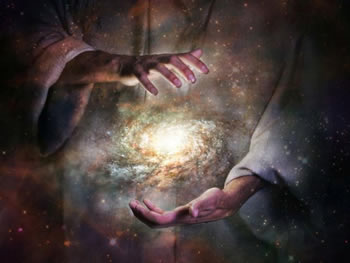For all I know, the answer may be both.
It seems to me perfectly reasonable to believe in God, but a God who conflicts with what we know requires much more faith than a God explained by what we can see.
I'll try and explain. If there is a God, which I believe there is, then I do not believe in a personal God that controls or is concerned with human affairs, guiding human actions and thoughts, or interferes with the natural laws of governs nature. These positions violate the concept of free will, and are contradictory in a religious sense. I think quoting a man I heard speak last year about the origin of the universe might be the most appropriate way to convey my belief about this:
"What could define God [is a conception of divinity] as the embodiment of the laws of nature. However, this is not what most people would think of that God...They made a human-like being with whom one can have a personal relationship. When you look at the vast size of the universe and how insignificant an accidental human life is, this seems most impossible." - Stephen Hawking
I wouldn't go so far as to agree with Professor Hawking on the insignificance of human life, but his definition of God is something I cannot help be swayed by. It speaks to the vastness of space and the miraculous survival of life on earth. The most attractive thing about this outlook is the definition of God. You see, the problem with most religions, with most conceptions of God, is a lack of definition-- something religions should strive for and borrow from scientific reasoning:
"To be sure, the doctrine of a personal God interfering with the natural events could never be refuted, in the real sense, by science, for this doctrine can always take refuge in those domains in which scientific knowledge has not yet been able to set foot. But I am persuaded that such behavior on the part of the representatives of religion would not only be unworthy but also fatal. For a doctrine which is able to maintain itself not in clear light but only in the dark, will of necessity lose its effect on mankind, with incalculable harm to human progress... If it is one of the goals of religions to liberate mankind as far as possible from the bondage of egocentric cravings, desires, and fears, scientific reasoning can aid religion in another sense."-- Albert Einstein
What Einstein is suggesting is that religion can be improved if grounded in the pursuit of truth, as science is, and becomes open to modification by the interpretation of facts. For me, I learned it best to describe what I do NOT believe to better understand what I DO believe. This logic is certainly borrowed from scientific reasoning and is called falsifiability, i.e. proving things false versus proving things true. It is presumptuous of any man to to think to prove a thing true. This is what drives the dogma of religion. It must be acknowledged that religion does, in every sense, operate in vague and unclear terms.
I feel the closest depiction of God is what Einstein and Hawking believed in which is essentially that the universe itself is god.
"If something is in me which can be called religious then it is the unbounded admiration for the structure of the world so far as our science can reveal it."
There is a regularity to all that moves in the universe, physics and chemistry; the laws of nature, and while science cannot prove God exists, it can disprove some of the more absurd claims of fundamentalist. I see each side of the debate of God: those for want to believe in a higher power, in the transformative power of love, but at the cost of truth and knowledge; and those against it, who see something contrived in believers, something hypocritical and self-defeating, but often at the cost of empathy. Both have something true to communicate. Both are at fault.
"The most beautiful experience we can have is the mysterious. It is the fundamental emotion which stands at the cradle of true art and true science. Whosoever does not know it and can no longer wonder, no longer marvel, is as good as dead, and his eyes are dimmed. It was the experience of of mystery-- even if mixed with fear-- that engendered religion. A knowledge of the existence of something we cannot penetrate, our perceptions of the profoundest reason and the most radiant beauty, which only in their most primitive forms are accessible to our minds-- it is this knowledge and this emotion that constitutes true religiosity; in this sense, and in this alone, I am a deeply religious man. I cannot conceive of a God who rewards and punishes his creatures, or has a will of the kind that we experience in ourselves. Neither can I nor would I want to conceive of an individual that survives his physical death; let the feeble souls, from fear or absurd egoism, cherish such thoughts. I am satisfied with the mystery of the eternity of life and with the awareness and a glimpse of the marvelous structure of the existing world, together with the devoted striving to comprehend a portion, be it ever so tiny, of the Reason that manifests itself in nature." -- Albert Einstein essay "The World as I See it"
Knowing what you believe (and what is knowable) is essential for human growth and happiness. Learning new things can give meaning to life. I would love to see more people try and codify what they believe as I am doing.
